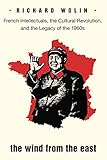The Wind from the East : French Intellectuals, the Cultural Revolution, and the Legacy of the 1960s / Richard Wolin.
Material type: TextPublisher: Princeton, NJ : Princeton University Press, [2010]Copyright date: ©2010Edition: Course BookDescription: 1 online resource (408 p.) : 6 halftonesContent type:
TextPublisher: Princeton, NJ : Princeton University Press, [2010]Copyright date: ©2010Edition: Course BookDescription: 1 online resource (408 p.) : 6 halftonesContent type: - 9780691154343
- 9781400834372
- China -- History -- Cultural Revolution, 1966-1976 -- Influence
- Communism -- France -- History -- 20th century
- Communism -- France -- History -- 20th century
- France -- Intellectual life -- 20th century
- HISTORY -- Europe -- France
- Intellectuals -- Political activity -- France -- History -- 20th century
- Intellectuals -- Political activity
- Intellectuals -- Political activity -- France -- History -- 20th century
- Intellectuals -- France -- History -- 20th century
- Intellectuals -- France -- History -- 20th century
- Mao, Zedong -- Influence
- SOCIAL SCIENCE -- Social Classes
- HISTORY / Modern / 20th Century
- 305.5/52094409046
- online - DeGruyter
- Issued also in print.
| Item type | Current library | Call number | URL | Status | Notes | Barcode | |
|---|---|---|---|---|---|---|---|
 eBook
eBook
|
Biblioteca "Angelicum" Pont. Univ. S.Tommaso d'Aquino Nuvola online | online - DeGruyter (Browse shelf(Opens below)) | Online access | Not for loan (Accesso limitato) | Accesso per gli utenti autorizzati / Access for authorized users | (dgr)9781400834372 |
Frontmatter -- Contents -- Prologue -- Introduction. The Maoist Temptation -- Part I. The Hour of Rebellion -- Chapter 1. Showdown at Bruay-en-Artois -- Chapter 2. France during the 1960s -- Chapter 3. May 1968: The Triumph of Libidinal Politics -- Chapter 4. Who Were the Maoists? -- Excursus. On the Sectarian Maoism of Alain Badiou -- Part 2. The Hour of the Intellectuals -- Introduction -- Chapter 5. Jean-Paul Sartre's Perfect Maoist Moment -- Chapter 6. Tel Quel in Cultural-Political Hell -- Chapter 7. Foucault and the Maoists: Biopolitics and Engagement -- Chapter 8. The Impossible Heritage: From Cultural Revolution to Associational Democracy -- Bibliography -- Index
restricted access online access with authorization star
http://purl.org/coar/access_right/c_16ec
Michel Foucault, Jean-Paul Sartre, Julia Kristeva, Phillipe Sollers, and Jean-Luc Godard. During the 1960s, a who's who of French thinkers, writers, and artists, spurred by China's Cultural Revolution, were seized with a fascination for Maoism. Combining a merciless exposé of left-wing political folly and cross-cultural misunderstanding with a spirited defense of the 1960s, The Wind from the East tells the colorful story of this legendary period in France. Richard Wolin shows how French students and intellectuals, inspired by their perceptions of the Cultural Revolution, and motivated by utopian hopes, incited grassroots social movements and reinvigorated French civic and cultural life. Wolin's riveting narrative reveals that Maoism's allure among France's best and brightest actually had little to do with a real understanding of Chinese politics. Instead, it paradoxically served as a vehicle for an emancipatory transformation of French society. French student leftists took up the trope of "cultural revolution," applying it to their criticisms of everyday life. Wolin examines how Maoism captured the imaginations of France's leading cultural figures, influencing Sartre's "perfect Maoist moment"; Foucault's conception of power; Sollers's chic, leftist intellectual journal Tel Quel; as well as Kristeva's book on Chinese women--which included a vigorous defense of foot-binding. Recounting the cultural and political odyssey of French students and intellectuals in the 1960s, The Wind from the East illustrates how the Maoist phenomenon unexpectedly sparked a democratic political sea change in France.
Issued also in print.
Mode of access: Internet via World Wide Web.
In English.
Description based on online resource; title from PDF title page (publisher's Web site, viewed 24. Aug 2021)


